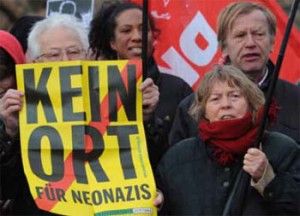What a Democratic State Owes Its Citizens
 Anti-semitism is not the problem of the Jews. Right-wing extremism is not the problem of the Turkish minority. Anti-semitism and xenophobia are problems that German society must address together. Combating anti-semitism, racism and xenophobia is a core element of Germany’s democracy. Banning the neo-Nazi party NPD is one part of this fight.
Anti-semitism is not the problem of the Jews. Right-wing extremism is not the problem of the Turkish minority. Anti-semitism and xenophobia are problems that German society must address together. Combating anti-semitism, racism and xenophobia is a core element of Germany’s democracy. Banning the neo-Nazi party NPD is one part of this fight.
The arguments often cited as reasons not to ban the NPD are almost all valid. We cannot extinguish neo-Nazism with the flip of a switch, and banning the NPD is certainly no magic button. The court in Karlsruhe does not have a remote control to switch off a fascist agenda. Tabling a draft resolution in the Bundestag for banning the NPD will not usher in a sweeping exorcism according to the rules of Article 21 of Germany’s constitution, the Grundgesetz, which lays out the circumstances under which political parties may be banned. It is not a magic spell that can exorcise fascist demons from society. It is not a substitute for the efforts we must make in combatting racism and xenophobia. And it is also the wrong way to demonstrate vigilance on this issue. Nevertheless, banning the party is necessary to protect the people who are not as strong as our democracy. A party that stands up for criminals and abets their crimes is really not a party at all, but rather a state-financed criminal organization. A party that makes common cause with perpetrators of violence must be denied the privileges of party status. This is what a constitutional state owes the victims of those aggressive acts. When people are threatened, beaten and shot, then the state cannot extend the mantle of party status to a milieu that sows the seeds of such brutality.
 The path is once again clear for a ban against the NPD. The people who cleared this path were the neo-Nazis themselves, the same neo-Nazis who committed acts of violence and are or were organized in the NPD. It took a long time to catch them in the act. However, indications are piling up that this neo-Naziparty is more than just a repugnant political organization. If that were all it was, then our democracy would have no choice but to tolerate it. Apparently, though, the NPD is also a den of violence. Potential victims have a right to be protected from this violence by the state, which can do so by banning the party.
The path is once again clear for a ban against the NPD. The people who cleared this path were the neo-Nazis themselves, the same neo-Nazis who committed acts of violence and are or were organized in the NPD. It took a long time to catch them in the act. However, indications are piling up that this neo-Naziparty is more than just a repugnant political organization. If that were all it was, then our democracy would have no choice but to tolerate it. Apparently, though, the NPD is also a den of violence. Potential victims have a right to be protected from this violence by the state, which can do so by banning the party.
In fact, it is imperative on the state to ban a violent party. According to a ruling handed down by the Federal Constitutional Court, no organization may “plan or prepare” serious crimes “under the guise” of a political party. Since the arrest of the former NPD functionary Ralf Wohlleben as an accessory to six murders, the obstacle that once prevented authorities from bringing a new case against the NPD has faded into the background. This obstacle was, namely, the use of informants by the police and investigative authorities. In its decision to end the first case against the NPD in 2003, the Federal Constitutional Court called on the police to “deactivate” their informants in the NPD, saying that was the only way to guarantee a fair process for banning the party. However, the court also explicitly noted one exception to this rule. The exception was that if a party promotes acts of violence, then banning it is so urgent that it is no longer necessary to wait until the informants have been deactivated in order to “defend against a clear and present danger.” Why? The wait could prove deadly.
This exception did not come into play in 2003. Few people at the time were aware of the direct connection between the NPD and violent crimes. None of the three petitions filed in the case to ban the NPD contained any indications to this effect. Now, the evidence is clear, and there is a promising new basis for a petition to ban the NPD. It is easy enough to discredit a fascist ideology through reasoned debate. No amount of reasoned debate can protect people from being beaten, harassed or killed by right-wing extremists, however. We must ban the NPD in order to protect innocent victims from assault and murder, not to protect democracy from nutcases. This is not a case in which the state is choosing an easy path, dealing with its critics by eliminating them. Rather, it is a case in which the state must use every tool at its disposal to protect human life and dignity.
